
Intellectual Property Theft: A Nigerian Corporate Masterclass

On Sunday December 20, 2020, Friday Emeh tried to kill himself.
He got his hands on as many pills as he could manage, and he purchased a bottle of Sniper. In one last desperate plea for help before ending it all, he posted a tweet with a picture of himself holding the Sniper bottle, apparently ready to drink its contents and end it all. Fortunately, a friend who lived nearby in Apo, Abuja, saw the tweet and rushed over to Friday’s house before he could carry out the threat.
I'm tired!!!!. I want to sincerely thanks Mr. Faruk and everyone who had in one way or other supported me,Thank you all. pic.twitter.com/fF1k50nAHX
— Friday Emeh (@Gkase4real) December 20, 2020
The story of what brought the upcoming recording artiste to that point is long, winding and a bit confusing. The characters in the story are not what you would expect, like a girlfriend who jilted him, or a friend who introduced him to an addictive substance, or anything that would ordinarily push a young man in his prime to the verge of committing suicide. This story is about what happens when a multinational consumer retail behemoth partners with a compromised Nigerian Copyright Commission (NCC), and a sloth-paced Federal High Court, to keep a victim of malicious wrongdoing in legal purgatory since 2014. Here is what happened.
‘G-Kase’ vs Shoprite
Under his stage name ‘G-Kase,’ Friday Emeh is one of several thousand hopeful upcoming musicians in Nigeria with dreams of becoming the next Wizkid, Olamide and Burna Boy. For the past 12 years since being discovered by A&R Executive and entertainment entrepreneur Faruk Adamu in 2009, G-Kase has worked hard to achieve success. With Faruk’s backing, he has recorded songs, shot videos, and put himself about on the Abuja music circuit, hoping for a lucky break.
So far, the lucky break has not arrived, but the problem may not be that he particularly lacks the talent or work ethic. The issue is that back in 2013, the one break he was supposed to have had was quite literally stolen out of his hands, and remains in legal and regulatory limbo to this day. In April that year, while working as a till attendant at a branch of Shoprite in Apo, Abuja, G-Kase and his manager decided to record a jingle for Shoprite and pitch it to his manager. For reference, it is common for upcoming recording artistes in Nigeria to go after advert gigs to build some buzz and make some money. Some like Ditweni, have even spun this into a highly successful and lucrative career in its own right.
On that day in April 2013, G-Kase approached his manager Samuel Asegiemhe with his song, and invited him to listen to it using his mobile phone headset. His manager liked the song, but according to him, all he could do was escalate anything regarding payment negotiation to upper management. G-Kase transferred the mp3 to his manager’s phone and went away hoping to hear back from him. Days, weeks and months passed with no word. Eventually G-Kase resigned from his job at Shoprite to focus on his music career. Nothing was heard from Shoprite’s management, so it was assumed that they decided not to use the jingle. Unknown to G-Kase, he was about to receive the rudest shock of his life.
A year and 7 months later in December 2014, his phone rang, and an incensed Faruk was on the other end of the line. “Why did you reach an agreement with Shoprite for this jingle without my knowledge?!” he wanted to know. A stunned G-Kase protested his innocence, insisting that he had no such agreement with Shoprite. Then why, Faruk demanded to know, was he listening to the song playing in the supermarket? He had come to the Shoprite store in Apo to buy some items ahead of Christmas, and – lo and behold – ‘Shoprite’ by G-Kase was playing on the PA system.
Very quickly, G-Kase and Faruk realised that they had been hustled by a multinational company. Instead of paying for the jingle which it liked enough to use for commercial purposes, it just took it without paying for it. In a subsequent legal notice sent to the Shoprite HQ in Western Cape, South Africa, Faruk explains what happened next:
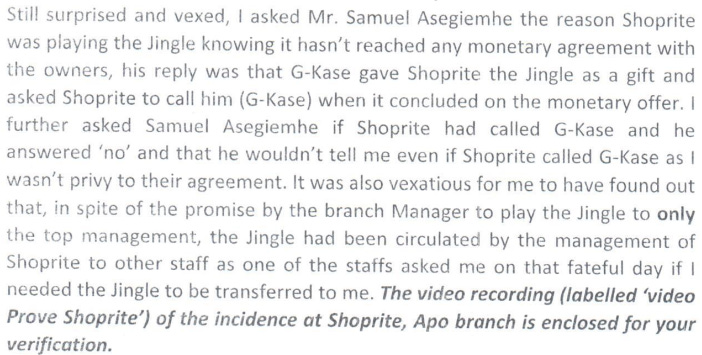
Faruk then sent Shoprite Nigeria a claim for N30 million, copying the DG of the NCC and the Branch Manager of Shoprite’s Apo store. Not realising that Faruk had made a video of the copyright infringement, Shoprite responded to this letter by denying that they ever used the jingle as stated. Even worse, the response went as far as to imply that G-Kase was not a good musician, noting that Shoprite did not use his work because the company was “not impressed.”
Don’t believe me? Have a look.
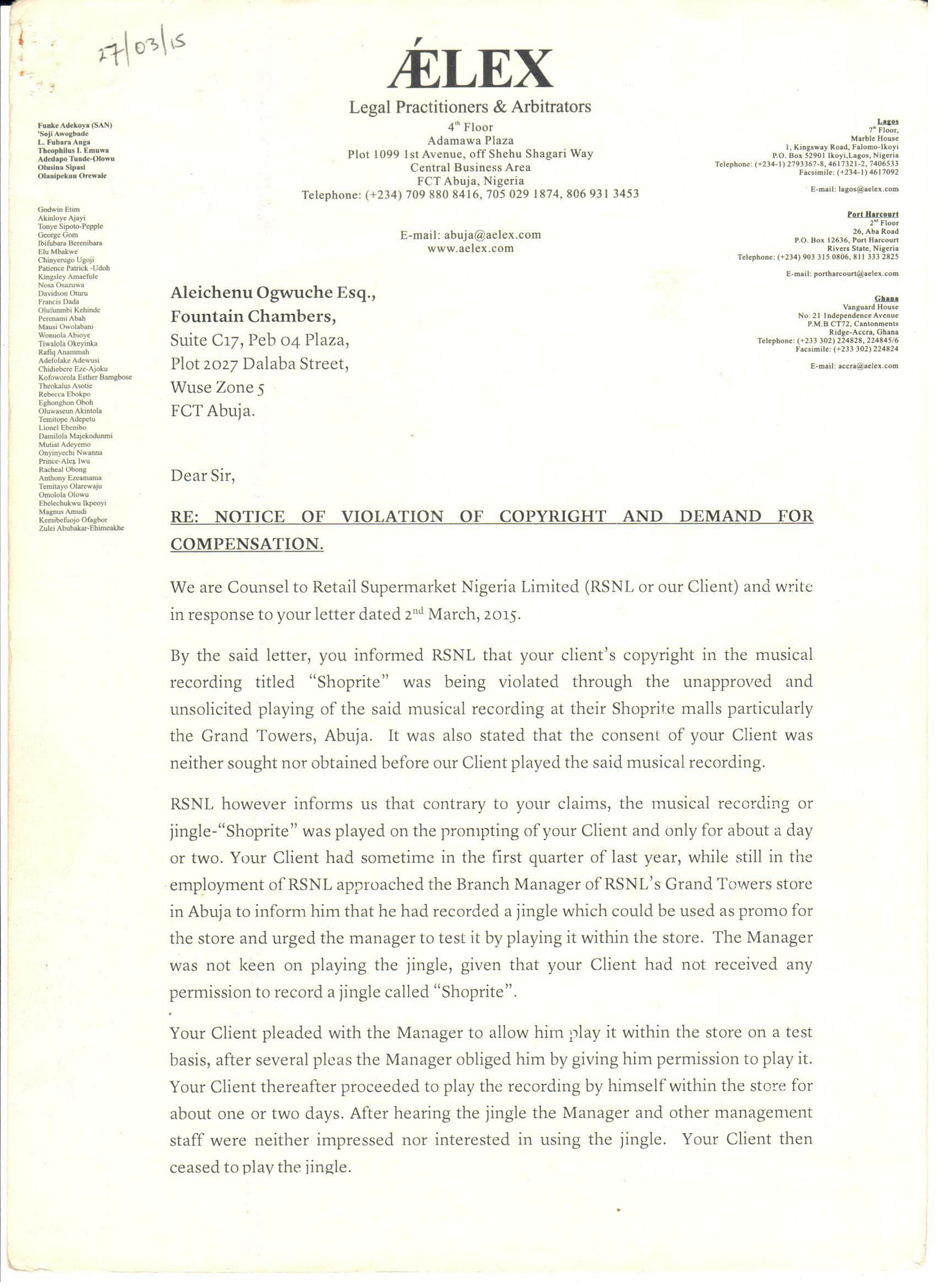

Upon realising that there was a video showing clear evidence that they were in fact using G-Kase’s recording without his permission, Shoprite changed tack. In a letter dated 23 July, 2015, Shoprite did an about-face and claimed that while the company did use the recording as claimed, it had every right to, since G-Kase was an employee at the time he presented the song to the company. According to Shoprite, a clause in his employment contract gave the company ownership of his copyright.
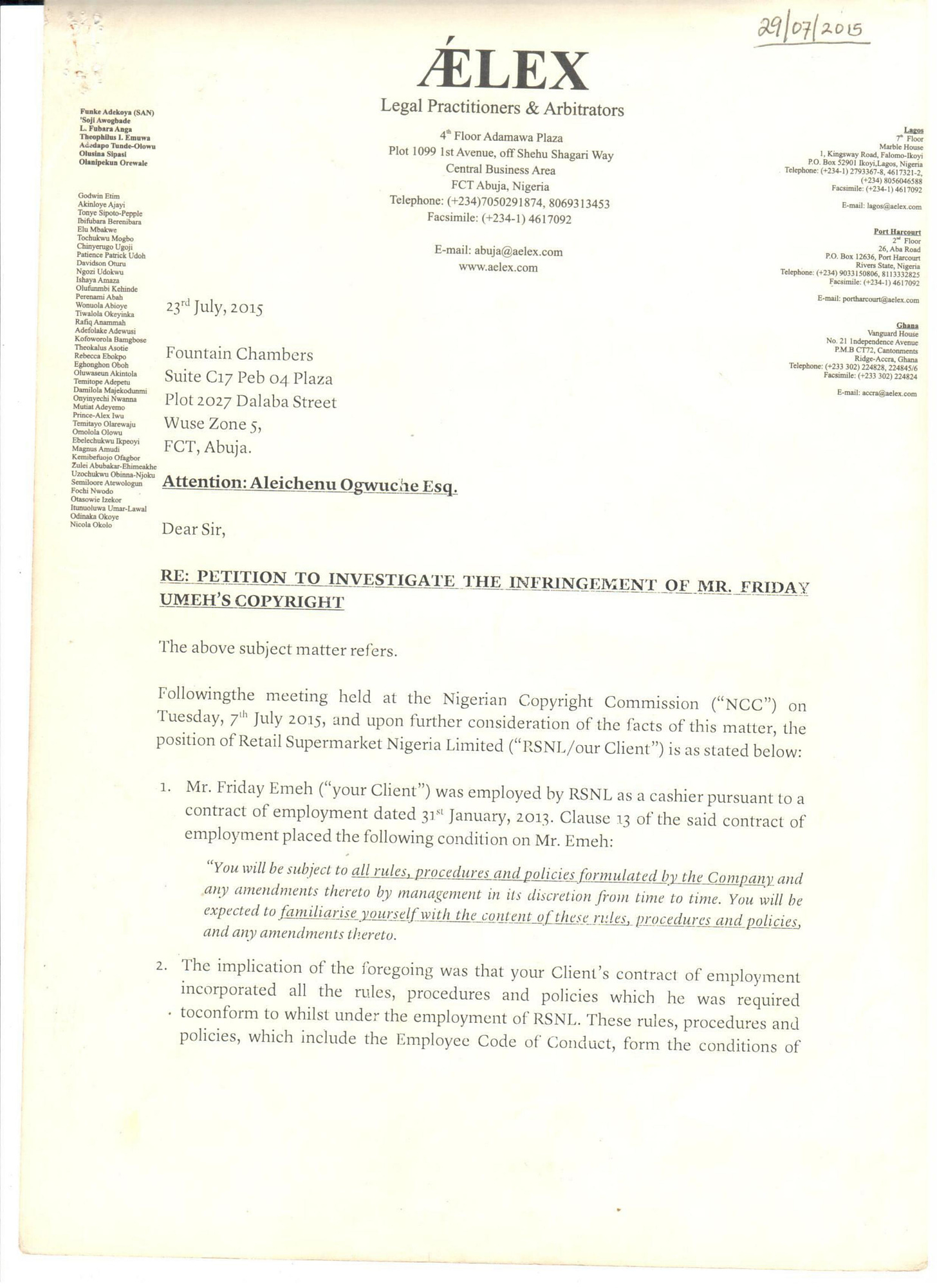
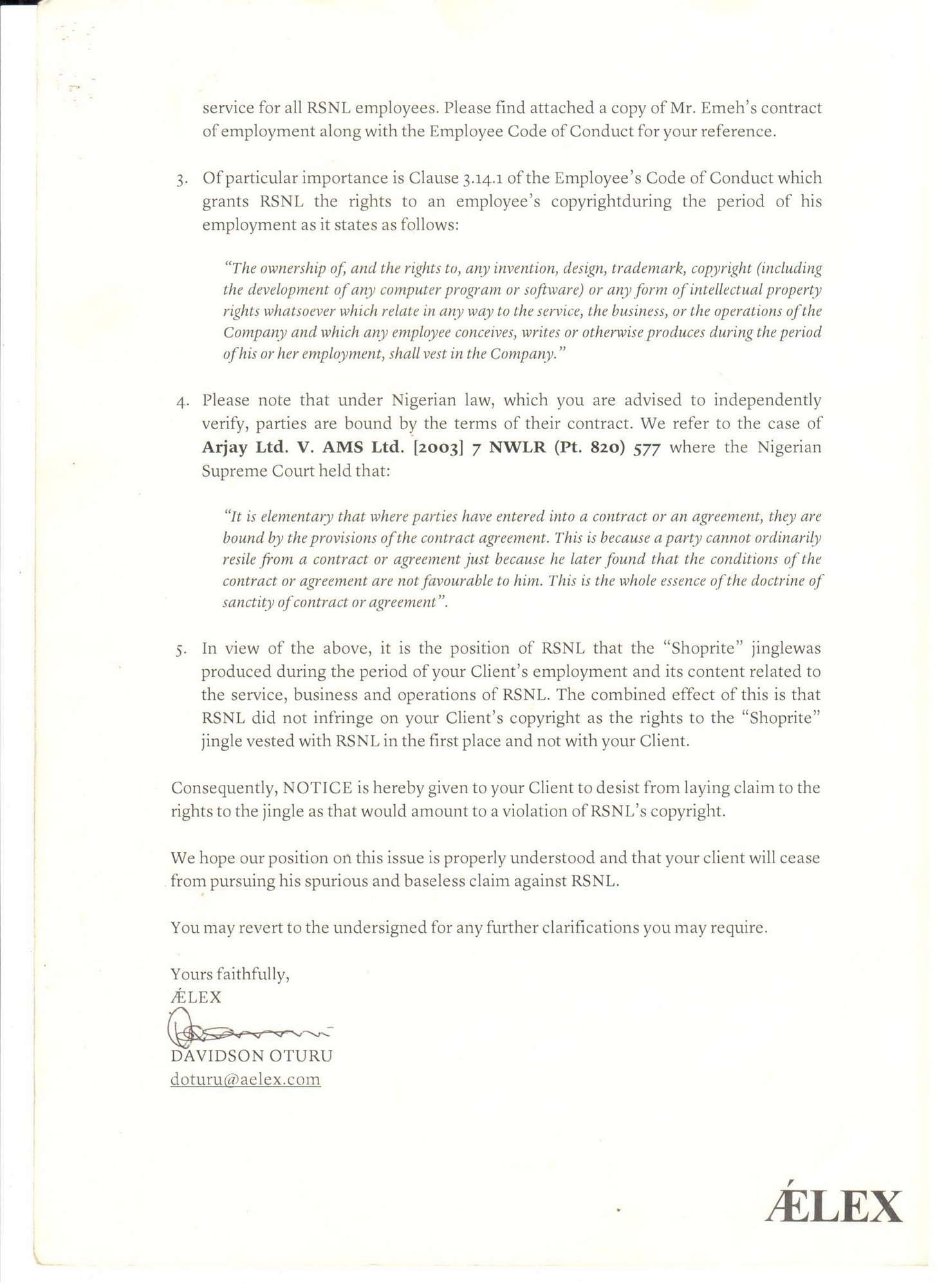
Anybody with some understanding of contract law recognises that the clause mentioned in the letter applies strictly to activities related to the employment in question. It would seem obvious that the jingle in question – recorded by a cashier who just happened to record a song using his own private resources outside of company premises and on his own time – cannot possibly be subject to this clause. However just to be sure, I sought an expert opinion on the matter from Solomon Igberaese, a legal practitioner. This was his response:
The intellectual property subject matter on the ownership of the product of the inventive activity of an employee is substantially dealt with by section 10(3) of the Copyright Act and section 2(4) of the Patents and Designs Acts. The above provisions only vest an employer with the product of an employee inventive activity where the product was made in the course of the employee’s employment. The course of the employee employment relates to the line in which the employee is engaged. Similarly, the employers’ tools, data and information must have been used to make the product subject matter, moreso if the product was made within the time of the employee’s engagement. However, failure by the employer to codify the rights of the employer in the employment contract to the employee’s inventive activity further erodes the right of the employer to whatever product the employee may make.
As bad as Shoprite’s absurd argument would appear, this was just the beginning of the company’s bad faith engagement. In the course of researching this story, I got my hands on Friday Emeh’s employment contract – the contract that Shoprite claimed contained the clause in question. This is that contract.
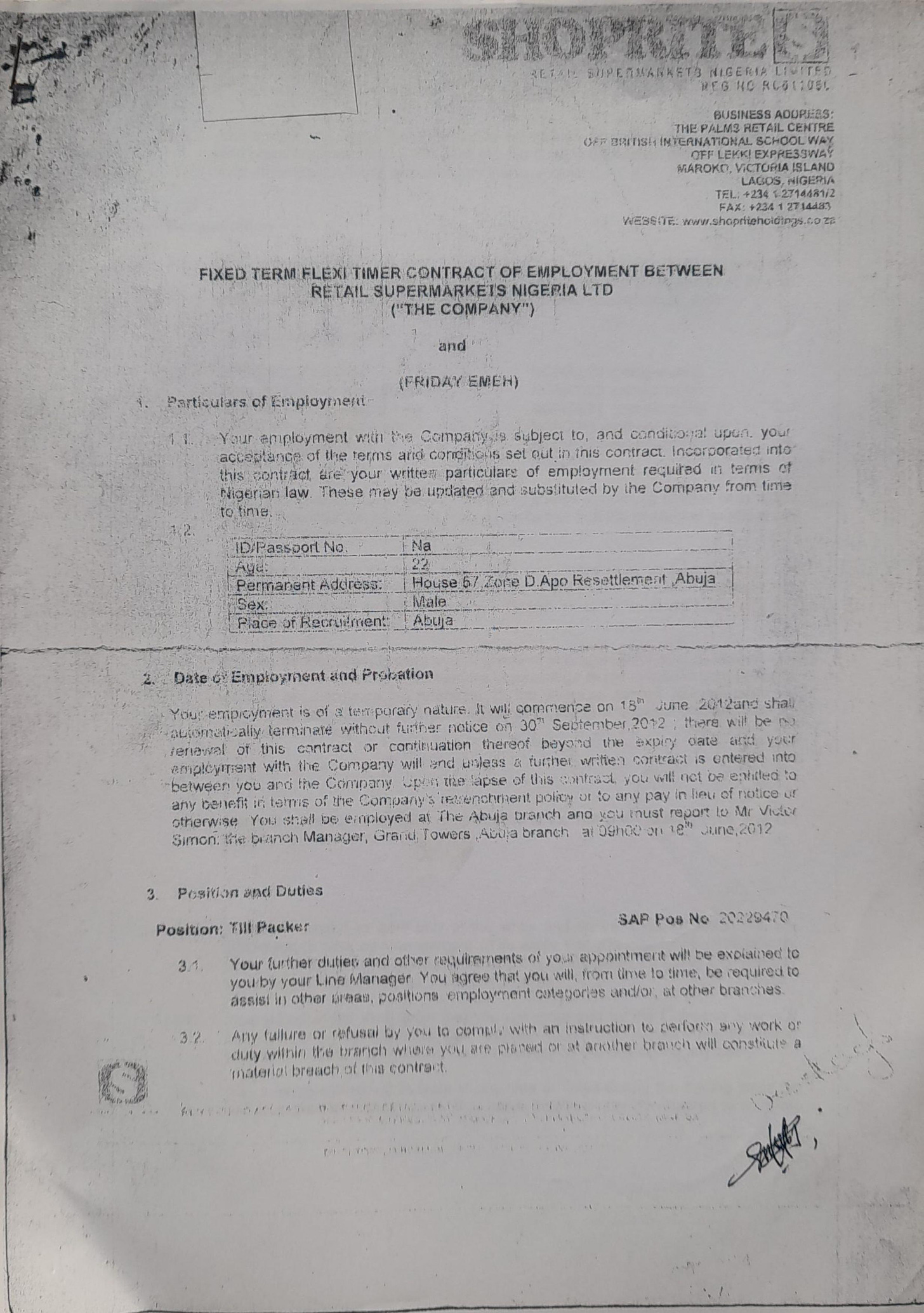
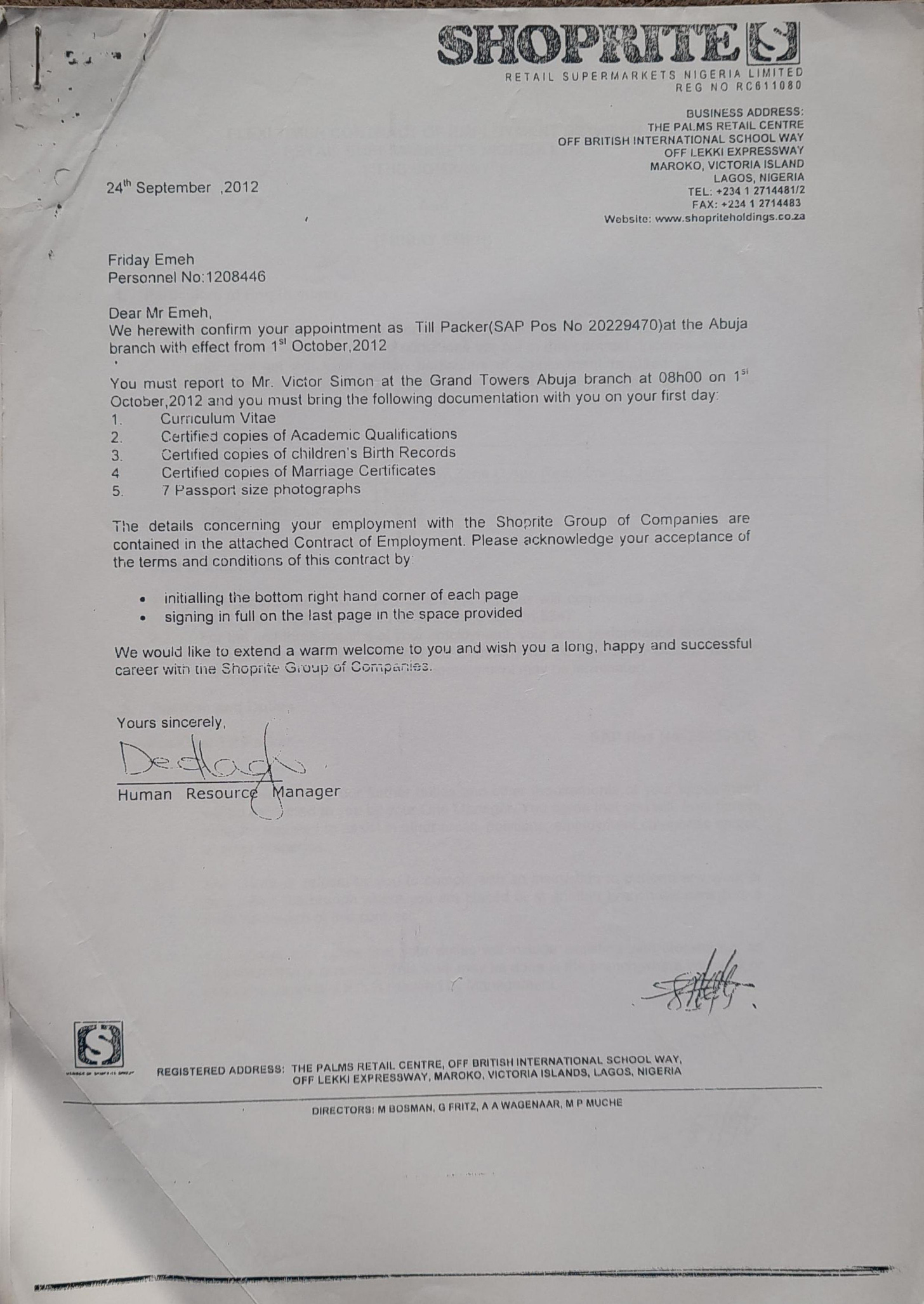
Notice the date on the contract and the type of contract it was (fixed term)? Below is the employment contract presented by Shoprite as supposed proof that G-Kase agreed to sign over his musical work to them when becoming a cashier. Notice any difference?
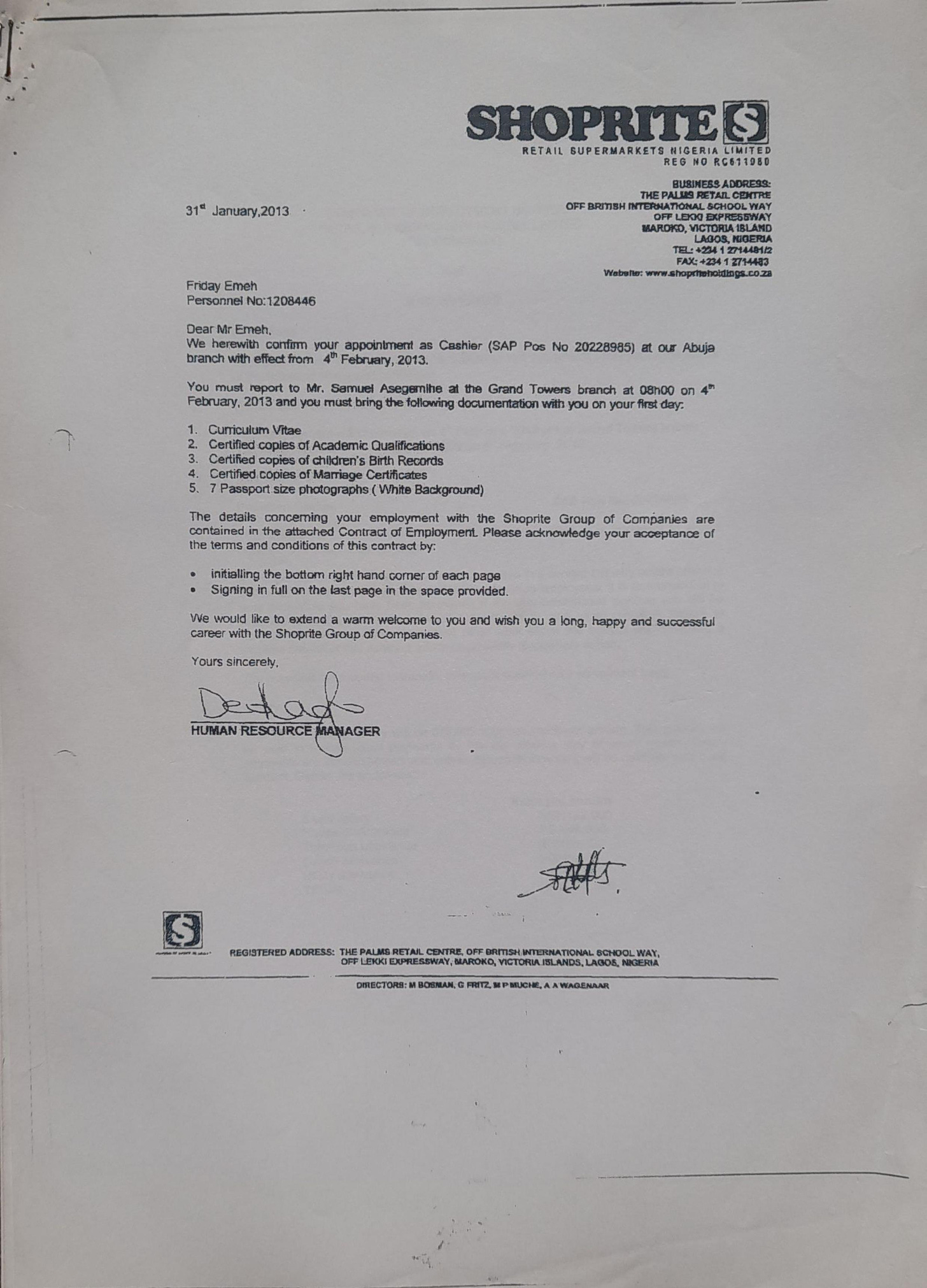
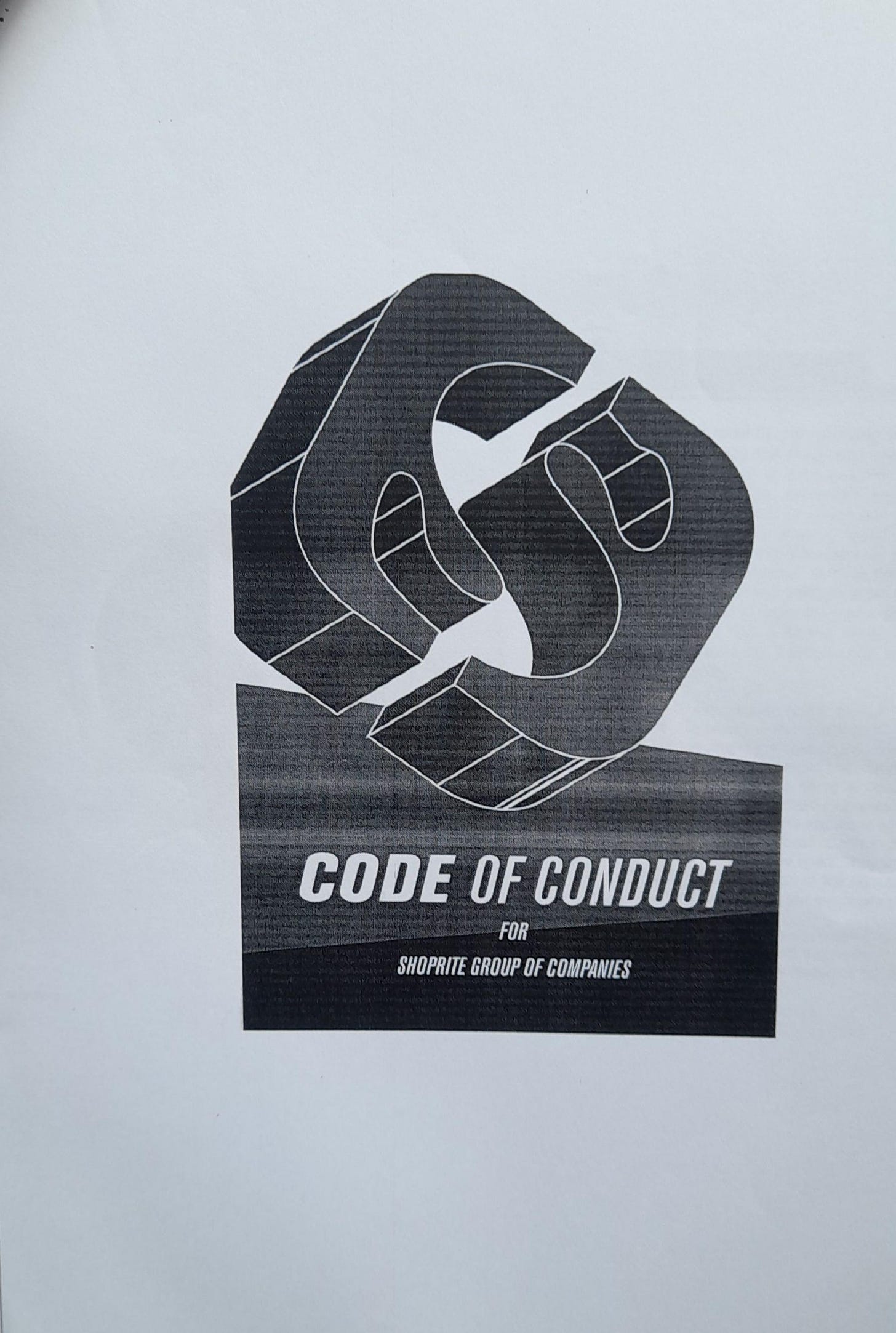
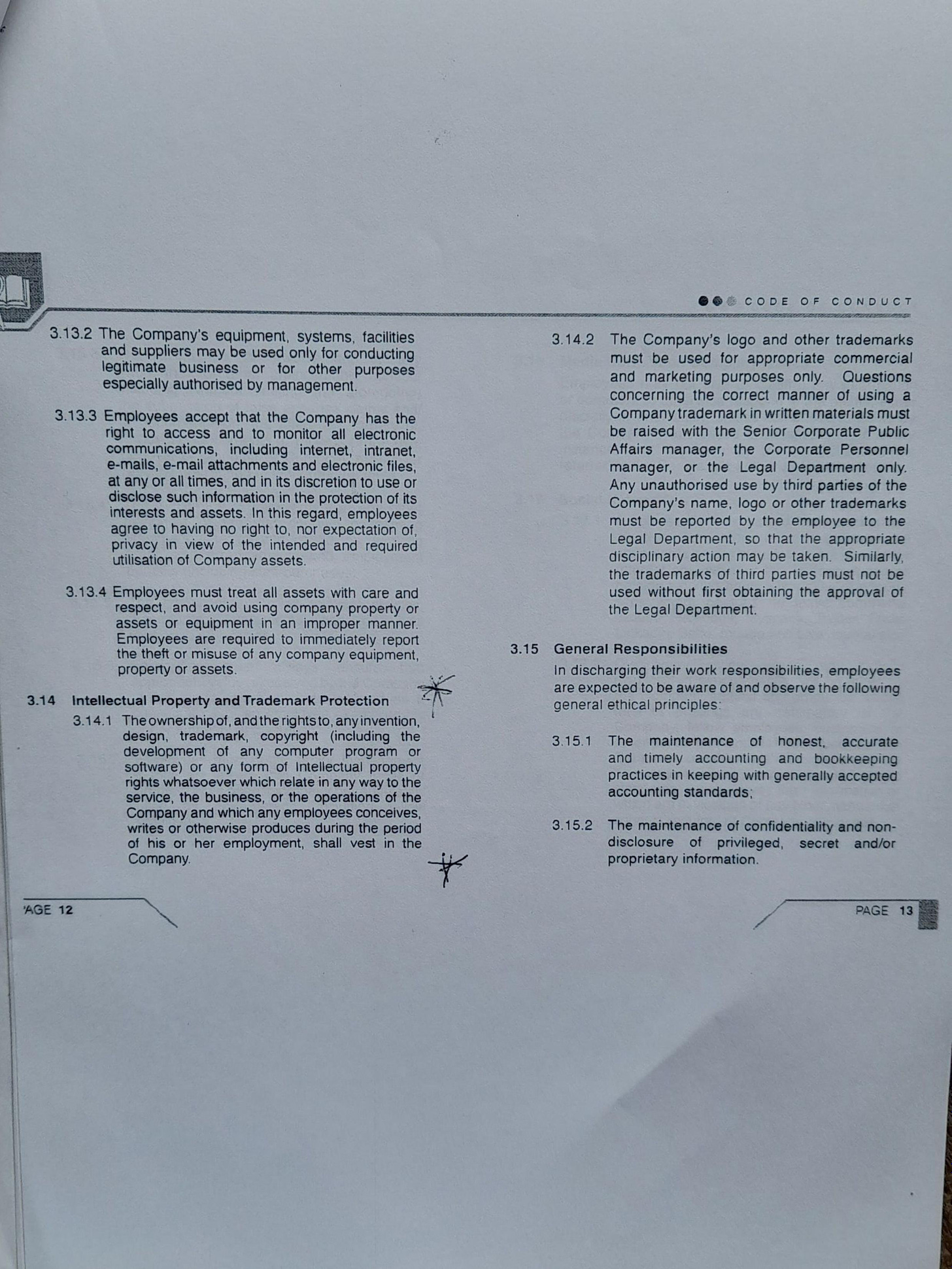
But it still somehow gets even worse.
By this time, Faruk’s complaint to the NCC had yielded some action against Shoprite. According to Faruk however, the NCC favoured an out of court settlement and actively pushed for this. Describing what happened, Faruk says:
“The commission through its investigations made arrest of some Shoprite officials and was pushing for amicable settlement. They demanded Friday steps down his compensation demands. The director of prosecution NCC (Mr. Abdul Kohol) made that demand and also insisted that Friday won’t be at the negotiation meeting with Shoprite, that the NCC would represent him. On that day we had a heated exchange with the director (Mr. Abdul Kohol) in presence of the investigating officer (Miss Chidinma). We accused him of being corrupt in his doings. Mr. Kohol said he will frustrate this matter and we’ll see how it ends since Friday claims to be too wise.”
Shoprite vs G-Kase
In September 2015, a few weeks after the encounter with Abdul Kohol of the NCC, Shoprite dropped the biggest bombshell yet. Apparently tired of defending itself in what it knew was a losing battle, the company decided to go on the offensive. Claiming that G-Kase violated its copyright by using the word ‘Shoprite’ in the title, the company sued the artiste for N100 million.
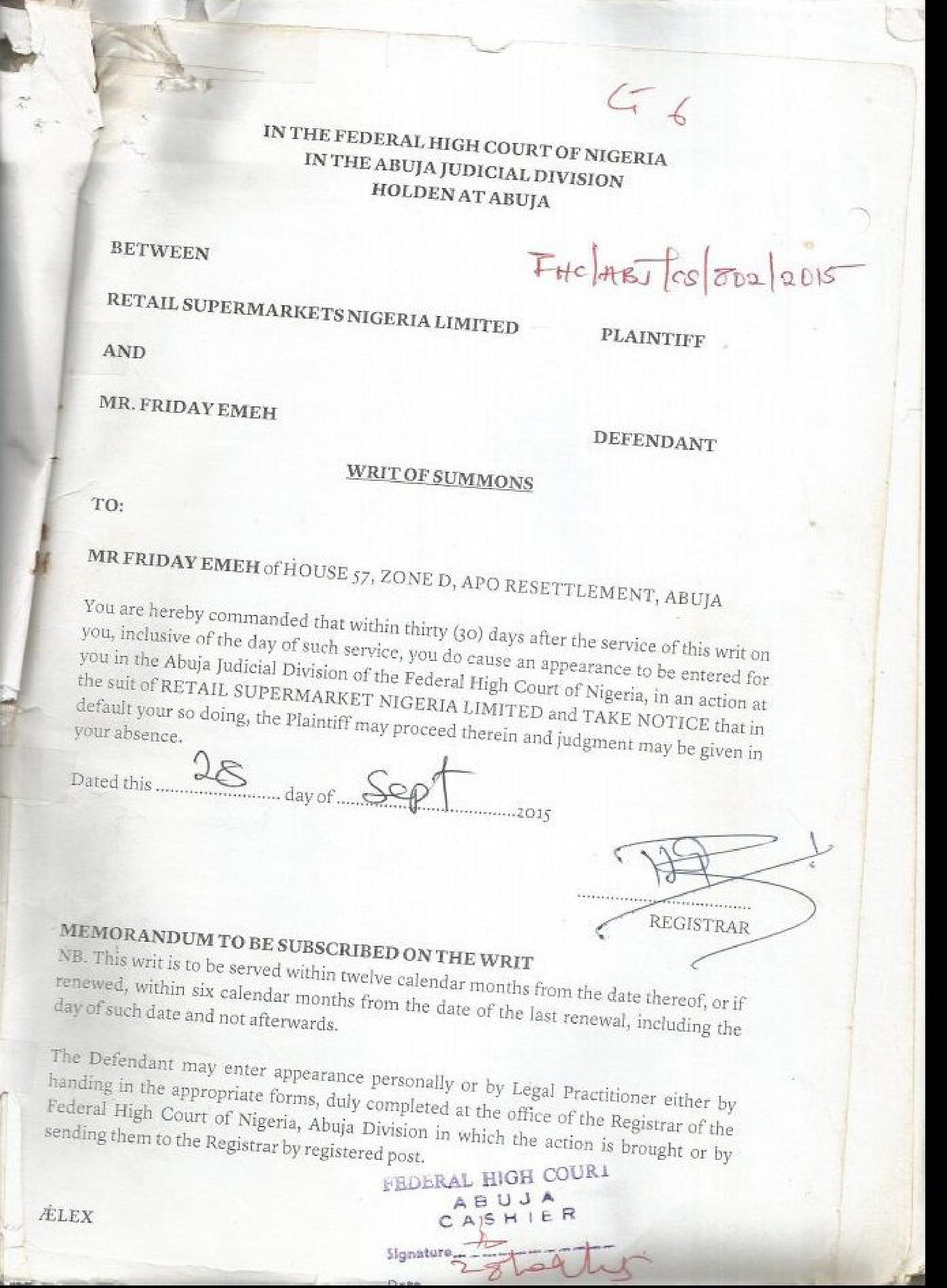
It was on the same day curiously, that the NCC chose to file criminal charges against Shoprite. A PDF copy of the filing is available here. Very tellingly, almost as soon as the NCC filed charges against Shoprite, the case was dismissed on the grounds of ‘No case submission’. Why? Because in what was apparently the greatest coincidence in the history of malfeasant Nigerian civil servants, the NCC’s prosecuting team failed to properly present the evidence tendered.
Faruk says he is sure that Shoprite’s N100m suit was engineered by Abdul Kohol, whose only goal in this matter was to negotiate alone with Shoprite. [Typically, when a Nigerian civil servant supposedly working for the public interest behaves like this, it is assumed that either they have been promised a payoff from the aggressing entity, or they are already on its payroll.] Faruk also believes that Mr. Kohol ensured that the NCC botched its criminal filing to let Shoprite off the hook.
In any case, Shoprite clearly has no intention of seeing this case through. According to Faruk, since 2016, the court has seated to hear the case unsuccessfully over 30 times, because Shoprite does everything in its power to drag it out and ultimately frustrate G-Kase. He has written to the Federal High Court requesting an expedited hearing, but that has not happened.
I lost my mom in 2016 and one of the things that disturbed her was this very suit against me. I've also missed study opportunities during these times.
As an ordinary Nigerian, I've been compelled to stay silent in the face of these oppression.— Friday Emeh (@Gkase4real) January 15, 2021
To all intents and purposes, it will not happen. The Public Complaints Commission too, has conveniently excused itself, citing the ongoing litigation. One struggling young man is thus left to fight against a malicious N100m lawsuit by a corporate behemoth, and somehow find his own justice.
In November 2020, i was served a quit notice by my landlord and summoned to a district court in Nassarawa because i couldn't pay up my rent. After explaining my situation to the court, the Hon. Judge was kind to ask my landlord to give me further time to pay up. pic.twitter.com/TJMS8ByJql
— Friday Emeh (@Gkase4real) January 15, 2021
It was in the depths of this vortex of legal bullying and despair that Friday Emeh nearly took his life a year ago. Going by the contents of this recorded phone call between Friday and the court registrar, Efeyinwa Nwankwo, Nigeria’s court system has no intention of giving him justice anytime soon.
An African Future – But Whose?
Adetola Onayemi and Iyinoluwa Aboyeji are the poster boys for high achieving young Nigerians. Tola graduated from the University of Lagos in 2012 with an LLB First Class Hons. He proceeded to the University of Cambridge to do his LLM in 2013, and subsequently racked up quite the CV.

There was a stint at the Organisation for the Prohibition of Chemical Weapons (OPCW) in the Netherlands, and a stint as Assistant Chief Negotiator for Nigeria & Head, Trade Remedies and Investigating Authority at the Nigerian Office for Trade Negotiations (NOTN), followed by a period working as a Special Adviser to Vice President Yemi Osinbajo on Industry, Trade and Investment. In 2019, he won the Future Awards Prize for Public Service.
Iyin is listed as a cofounder on two African tech unicorns – Andela and Flutterwave.

His work at Andela contributed to the growth of Nigeria’s emerging tech sector by deepening the talent pool of developers and helping place Nigeria firmly on the map as a global hotspot for affordable, high quality development talent. After exiting Flutterwave successfully, he set up Future Africa, a tech-focused investment fund which pools money and insights from notable tech founders and builders across Africa.

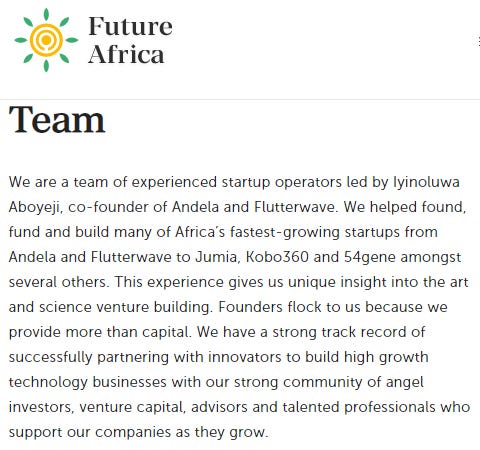
On the face of it, these two represent the best of Nigeria’s young and entrepreneurial generation, which is breaking glass ceilings and achieving great things long before the landmark age of 40. There is just one problem. This is a problem I have heard whispers about for years, but precious little from people willing to stand publicly. Iyin and Tola, the rumours go, are veterans at stealing other people’s ideas and taking public credit for other people’s work.
Occasionally, the odd tech old-timer who has seen the entire story unfold would tell me something to the effect of “Jeremy [Johnson] ran Andela completely. And [Iyin’s] co-founder at Flutterwave ran it entirely as well. He’s just a good front man” (this is an actual quote). Upon further pressing however, they would always elect not to speak further. This changed recently, when a startup co-founder reached out to me with not just a story, but a trail of documented evidence pointing unmistakably at deliberate and egregious intellectual property theft by Future Africa. Here is what I found.
Sidebrief vs Norebase
On May 10, 2021, a tech startup sent a pitch email to Future Africa. Sidebrief, which bills itself as a one-stop solution to start, scale and operate businesses across Africa sent out pitches to investors including YCombinator and Future Africa. Now (this is important), what Sidebrief proposes to do is to provide businesses with a single platform to help them with registration, regulatory compliance and tax compliance in the most diversely-regulated continental market in the world.
Basically, if you are a business in Nigeria looking to grow across Africa, instead of the expensive and slow process of hiring consultants and lawyers across every single jurisdiction in Africa you want to expand into, you simply register on this electronic platform and it does all the regulatory legwork for you. Creating corporate entities, registering directors and shareholders, provision of simplified tax and regulatory information – everything is available in one place and at the touch of a keypad.
If that sounds like a great idea, that is probably because it is. It was so great in fact, that Future Africa decided to take it. Only, instead of responding to the pitch with an invitation to meet and negotiate investing in it, the company decided to take it. As in just take it. Sidebrief never heard back from Future Africa. Below is the automated email response from Future Africa following Sidebrief’s pitch, which was the only contact Future Africa ever made.
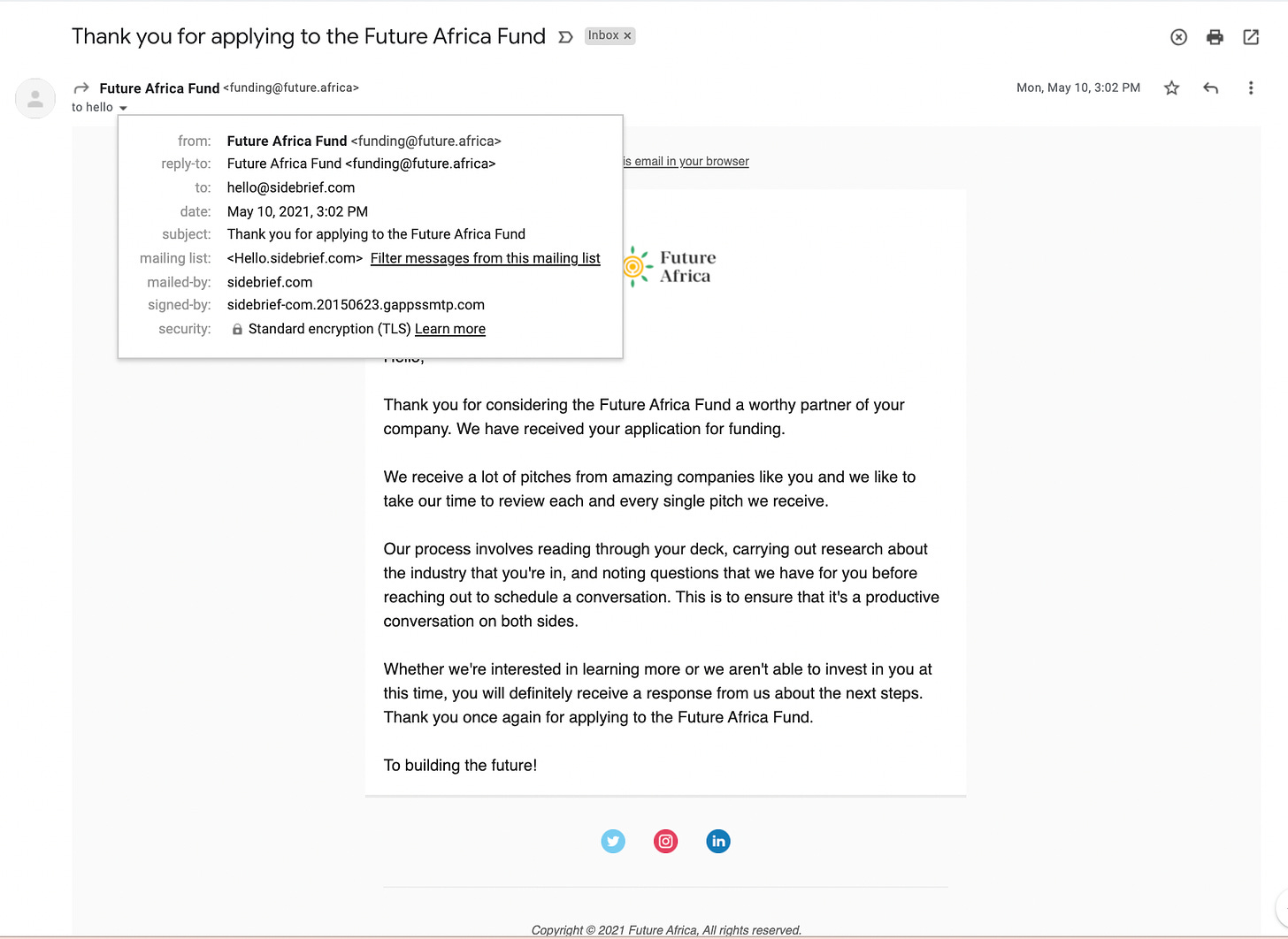
On May 31, 2021 – 3 weeks after Future Africa received the pitch from Sidebrief – the company’s General Counsel and co-founder, Tola Onayemi, registered a business called Norebase in the UK.
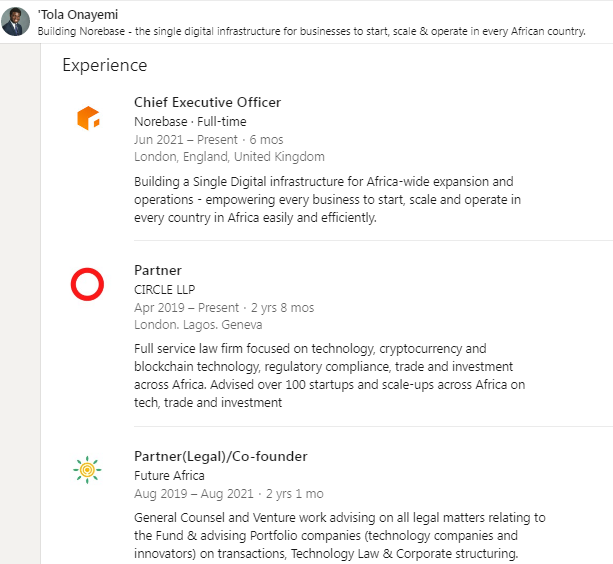
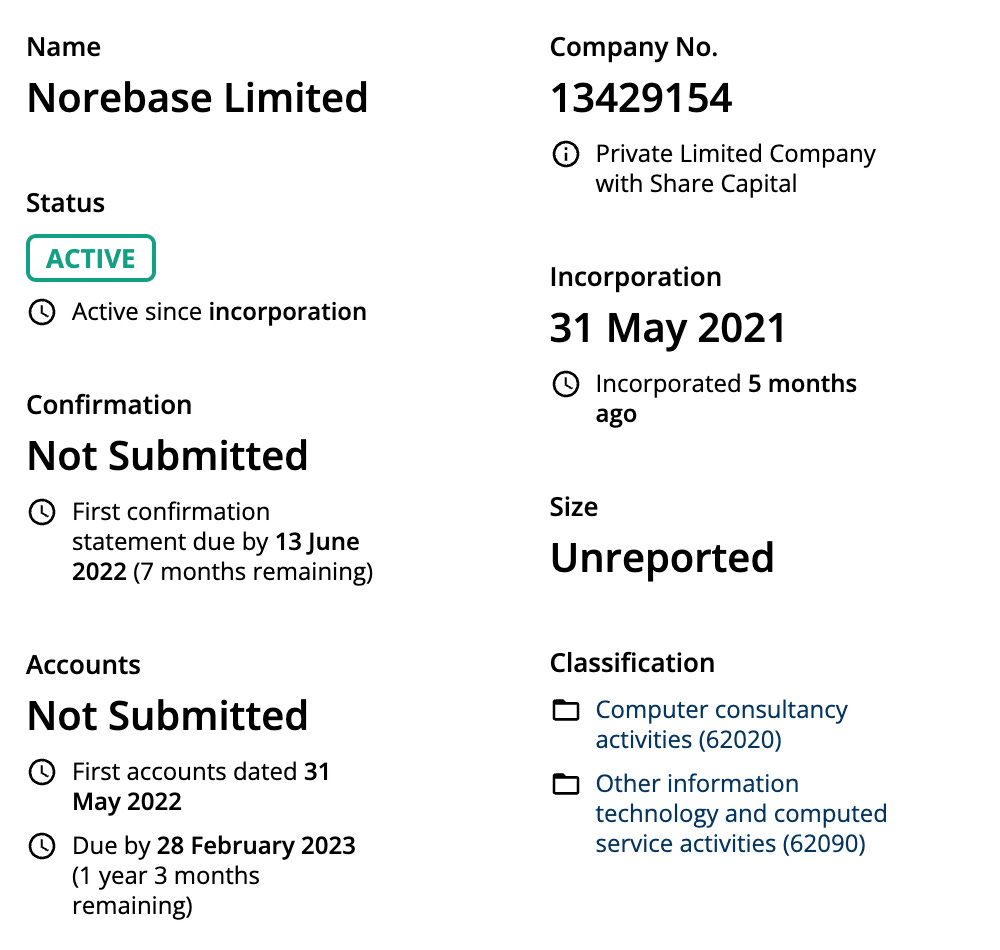
What does Norebase do? I’ll let its own marketing materials answer that question.

In case you are thinking this is just a fortuitous coincidence, the following screenshot comparisons between the materials Sidebrief sent to Future Africa, and the materials created by Norebase should clear all doubts.
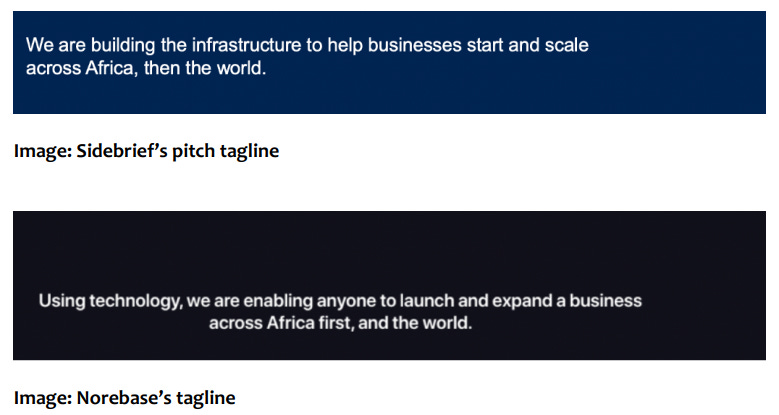

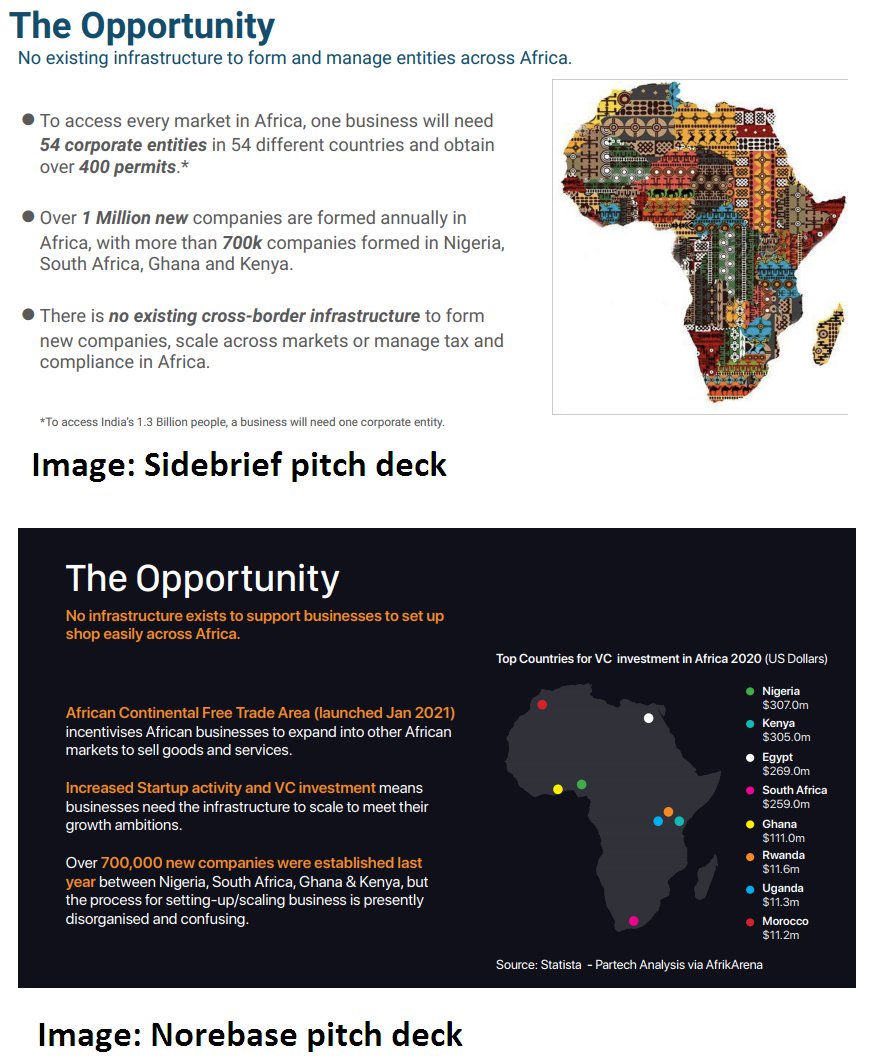
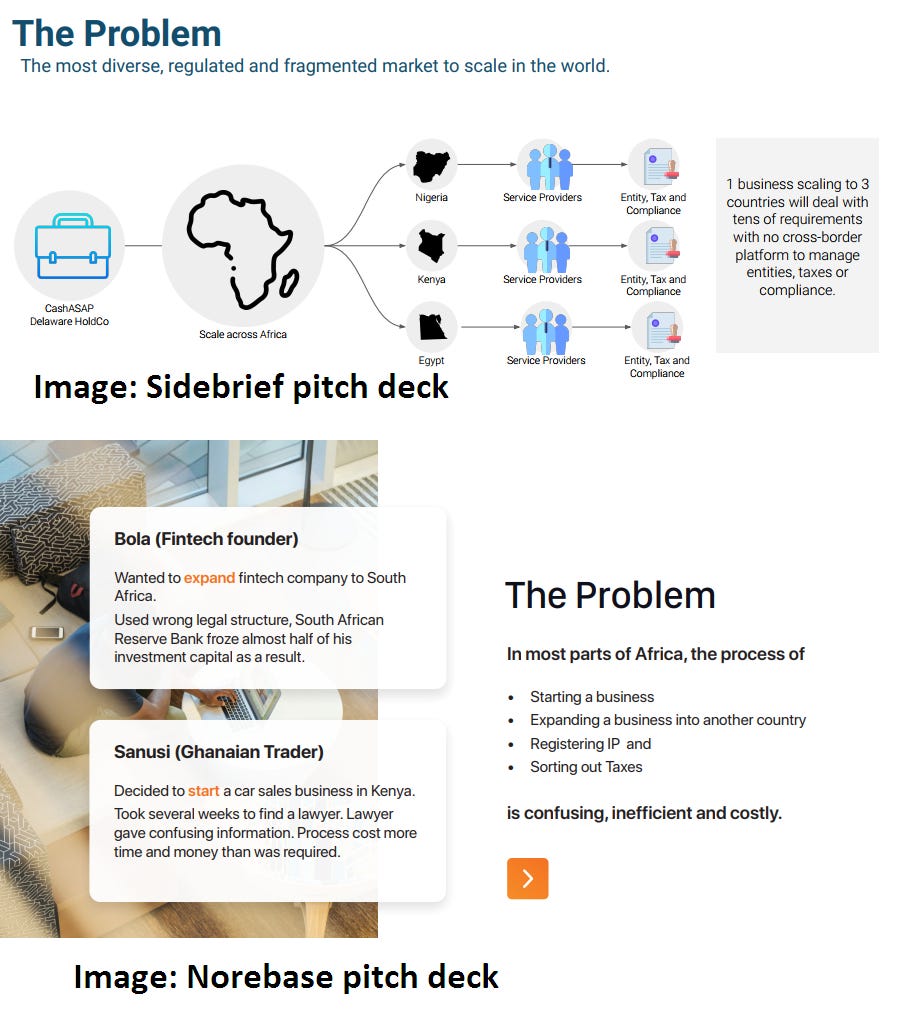
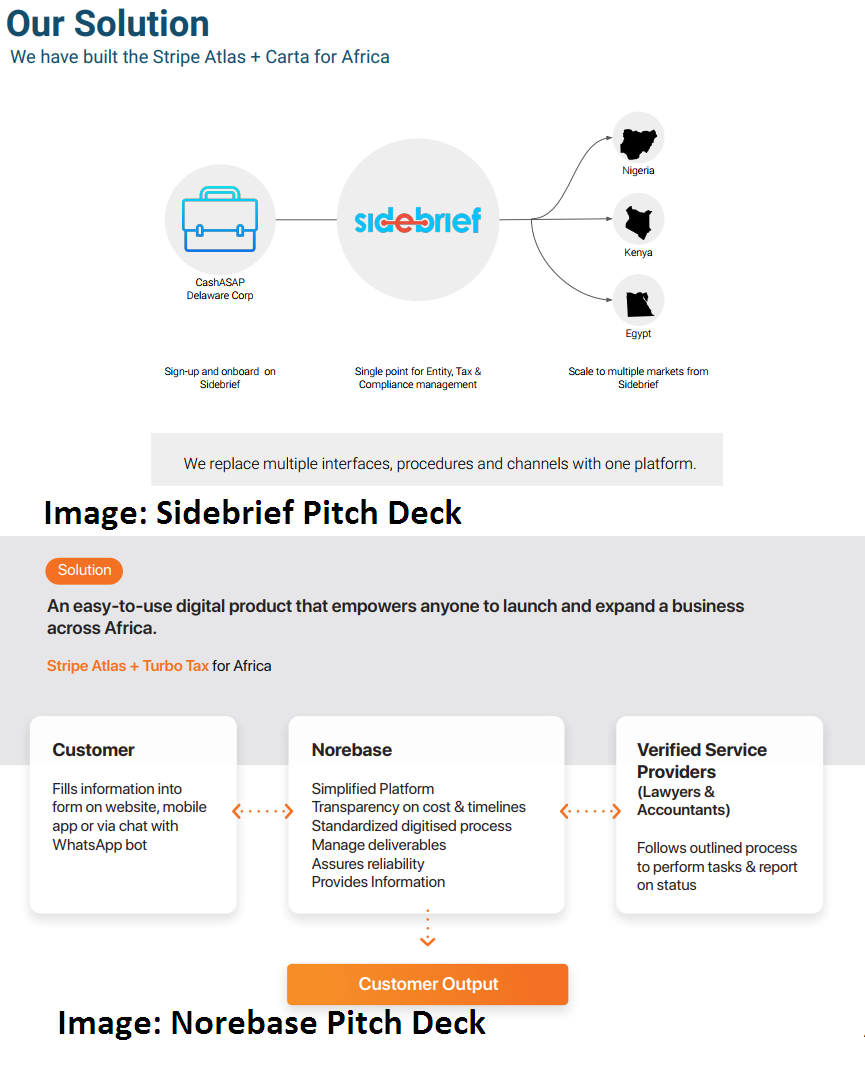
It goes on and on and on like this. In fact you can do the comparison yourself. The Sidebrief original Pitch Deck is here. The Norebase facsimile is here. Spot the difference, if you can.
Oh but it gets worse.
Tola wasn’t just satisified with stealing an entire fully formed business idea and hastily Ctrl+G-ing some altered text like a dishonest university student trying to beat TurnItIn, he even went to the Sidebrief platform, registered on it and spent several hours comprehensively testing out all its features – features which Norebase coincidentally also now offers. I have got to be making this up, right? Below are screenshots from Sidebrief’s database backend. Bear in mind that Tola is a partner at Circle LLP.
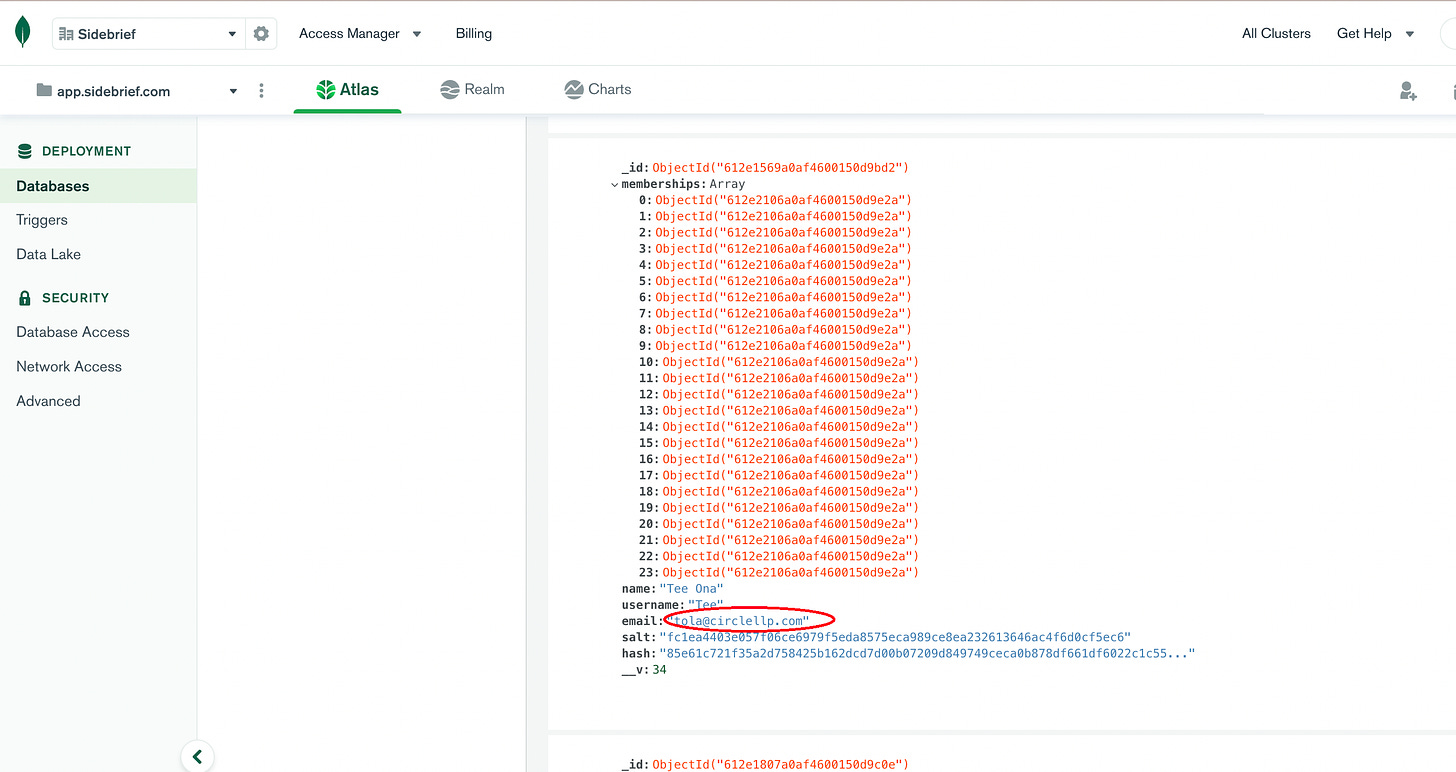
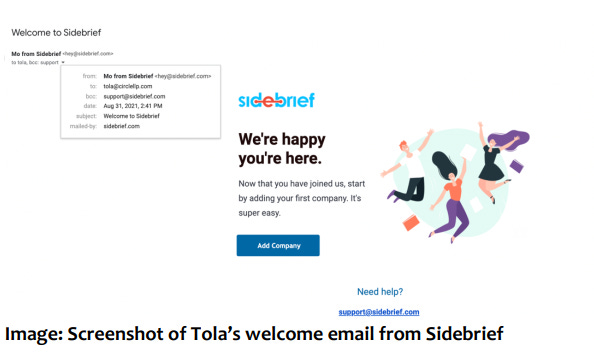
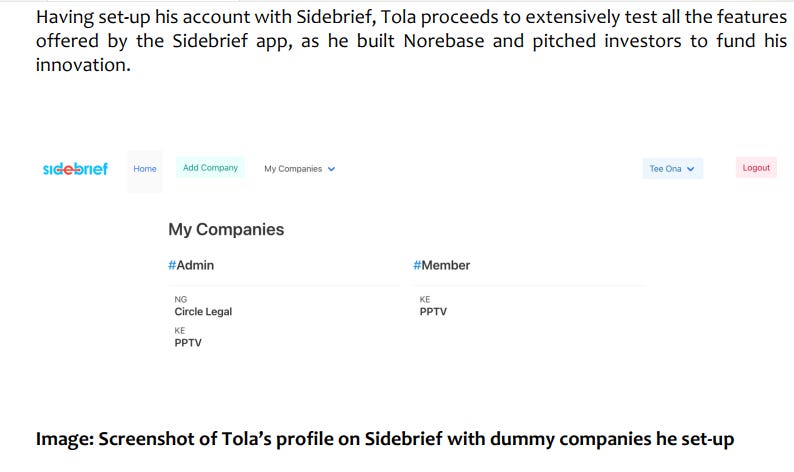
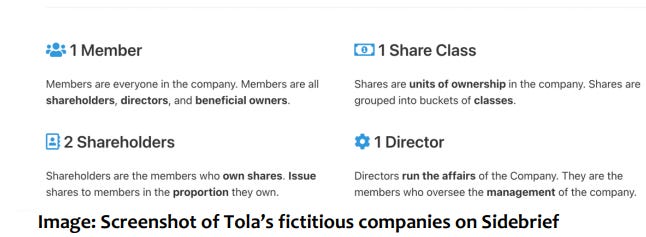
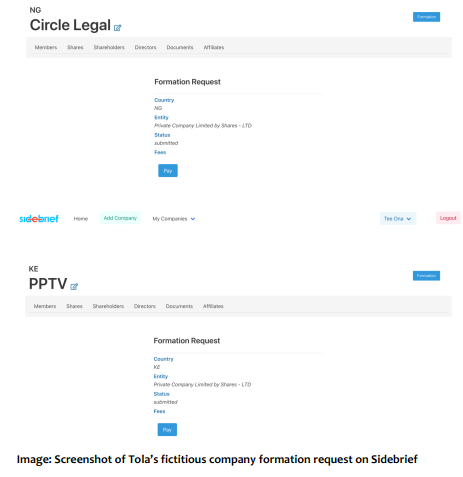
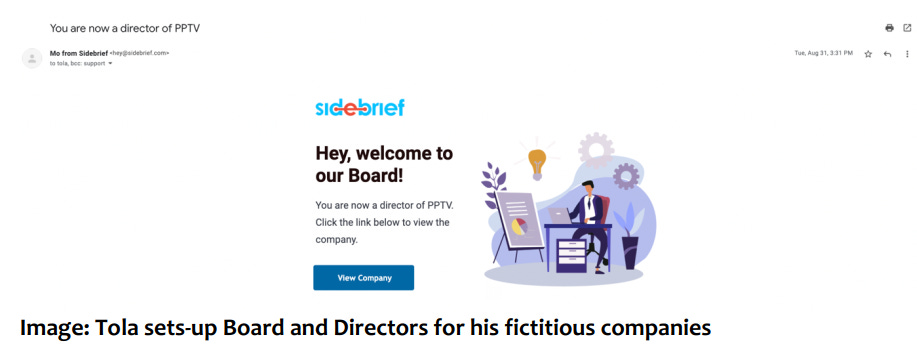
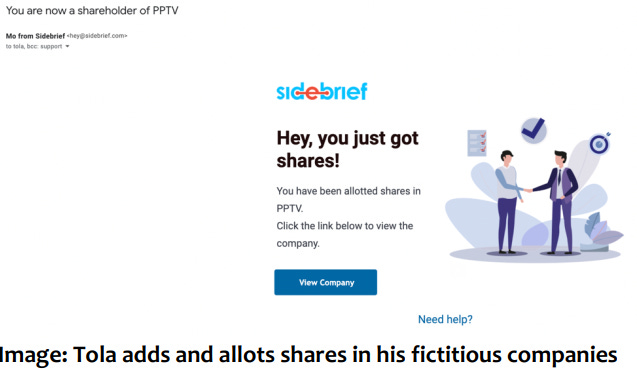

Initially unaware of the identity of this “new user” and his mission to comprehensively plagiarise their entire platform, Sidebrief actually reached out to Tola, trying to engage him. He of course, never responded. Norebase has reportedly raised at least $1,000,000 as at last count.
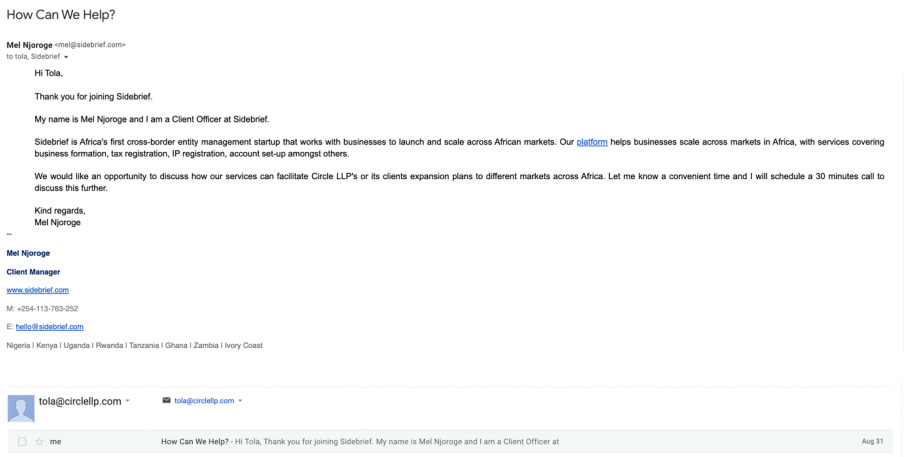
Some of Nigerian tech’s best known names are involved in this project built entirely on IP theft.

In 2018, Tola delivered a TEDx lecture where he talked about the importance of intellectual property, greed and consequences.
Indeed, Tola.
Indeed.

Read more: How to Spoof an Entire Career: The Curious Story of Kemi Olunloyo
Cornflakes for Jihad: The Boko Haram Origin Story
About The Author
Related Articles
Trump’s Greenland Threat Forces Europe to Taste the Logic of Western Colonial Power
It rarely begins with soldiers. More often, it begins with a sentence,...
ByWest Africa WeeklyJanuary 21, 2026Tinubu Government Claims Intelligence Cooperation With the US, Yet New York Times Publishes Conflicting Story Following $9 Million US Lobbying Effort
When the New York Times published its investigation suggesting that claims from...
ByWest Africa WeeklyJanuary 19, 2026Malian Army Conducts Successful Surveillance Operation in Mopti Region
The Malian Armed Forces have carried out a successful territorial surveillance operation...
ByWest Africa WeeklyJanuary 19, 2026Niger’s Security Forces Record Major Gains Against Armed Groups
Niger’s Defence and Security Forces have reported significant results following a week...
ByWest Africa WeeklyJanuary 19, 2026







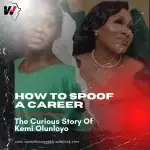




Leave a comment